Critics have raised concerns that new rules limiting anti-Israel protests on college campuses are impinging on free speech. However, a Cornell Law professor has argued that many of these new policies are simply explicitly stating existing policies and are aimed at protecting Jewish and Israeli students’ rights to safety on campus. As students prepare to return to campus this fall, higher education officials have developed strategies to balance the rights of protesting students with the safety and educational needs of others.
The stakes surrounding these interventions are high, with recent events such as Columbia University President Minouche Shafik resigning amid accusations of allowing anti-Israel agitators to run rampant without intervention. Colleges have implemented various new rules, including the banning of encampments, restrictions on protest spaces, requiring protesters to register in advance, and limiting the duration and nature of demonstrations. However, the American Association of University Professors has criticized these policies as overly restrictive and discouraging free expression.
Critics have warned that there is a resurgence of repression on college campuses reminiscent of the late 1960s. Despite this, the Cornell Law professor insists that many of the additional measures are already implicit in existing rules but had not been explicitly stated. He pointed out that policies against camping on campus grounds, for example, were already in place. Various universities, such as the University of Pennsylvania and Indiana University, have imposed new guidelines for student protests, banning overnight demonstrations and setting restrictions on bullhorn and speaker usage after certain hours.
The debate over these new rules raises questions about the balance between free expression and safety on college campuses. Some argue that the restrictions are necessary to prevent intimidation and create a toxic atmosphere for certain students. The professor believes that the critics of the new rules are engaged in what he terms ‘cry-bullying,’ attempting to intimidate others while crying foul when their actions are restricted. Despite potential legal challenges to these policies, as long as they are reasonable time, place, and manner restrictions, they are likely to be upheld as consistent with the Constitution.
Overall, the discussion surrounding anti-Israel protests on college campuses underscores the complex interplay between free speech, safety, and the rights of students to express their views. While critics argue that the new rules limit freedom of expression, others believe they are necessary to prevent intimidation and harassment on campus. The ongoing debate is likely to continue as universities navigate the delicate balance between protecting students’ rights and ensuring a safe and inclusive learning environment for all.













